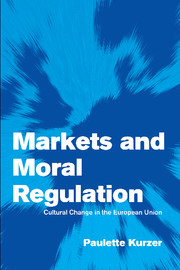Book contents
- Frontmatter
- Contents
- List of tables
- Preface
- 1 Markets versus morality
- 2 Binge drinking: the evolution of alcohol control policy in Finland
- 3 Our greatest social problem: anti-alcohol policy in Sweden
- 4 Nordic morality meets the European Union
- 5 Permissive pragmatism: drug control policy in the Netherlands
- 6 Harm reduction meets the EU: from public health to public order
- 7 Irish moral conservatism and European sexual permissiveness
- 8 The emergence of a European morality?
- Bibliography
- Index
5 - Permissive pragmatism: drug control policy in the Netherlands
Published online by Cambridge University Press: 16 October 2009
- Frontmatter
- Contents
- List of tables
- Preface
- 1 Markets versus morality
- 2 Binge drinking: the evolution of alcohol control policy in Finland
- 3 Our greatest social problem: anti-alcohol policy in Sweden
- 4 Nordic morality meets the European Union
- 5 Permissive pragmatism: drug control policy in the Netherlands
- 6 Harm reduction meets the EU: from public health to public order
- 7 Irish moral conservatism and European sexual permissiveness
- 8 The emergence of a European morality?
- Bibliography
- Index
Summary
In spite of its notoriety, Dutch drug control policy resembles that of many other advanced industrialized countries. Emma Bonino, the former Commissioner for Consumer Policy and for Humanitarian Affairs of the European Union came out in public in favor of Dutch-style decriminalization of cannabis, after the European Drugs Observatory issued a report showing “little relationship” between strict prohibitionist policies and reductions in the number of drug offenses. Nevertheless, the Netherlands is known as Europe's drug Mecca. The aim of this chapter is to highlight how Dutch drug policy diverges from conventional standards, why this particular form of intervention is representative of Dutch collective selfidentity, and how institutions and interests interpret and rationalize the Dutch way of doing things.
The Netherlands deviates from the rest of Europe in that it views the circulation of illicit drugs as a public health issue rather than a law and order crisis. Like Nordic alcohol policy, Dutch drug policy aims to reduce harm to the individual and society so that assistance and prevention go hand in hand with detection and prosecution of punishable offenses. Three government departments are involved in drug policy deliberation and implementation: Interior, Justice, and Public Health. The latter is in charge of overall coordination. Of course, as every tourist will testify, the most striking facet of Dutch drug policy is the coffee shop. This establishment sells small amounts of hashish and marijuana for personal use alongside ordinary refreshments. First opened in Amsterdam, coffee shops are now found across the country.
- Type
- Chapter
- Information
- Markets and Moral RegulationCultural Change in the European Union, pp. 97 - 120Publisher: Cambridge University PressPrint publication year: 2001



